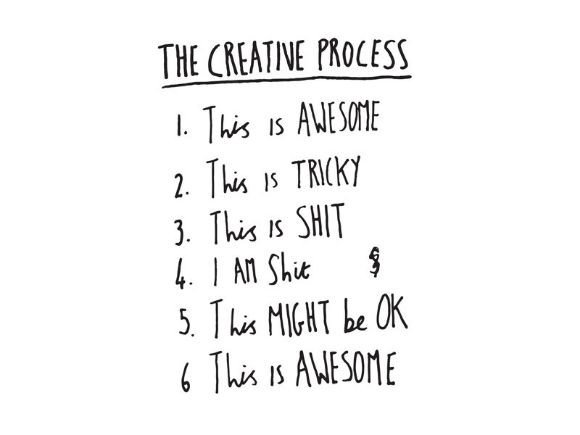10 tricks for getting of your own way to make great things happen
It can feel uncomfortable, even scary, to start unleashing your ideas on the world.
Some of the challenges I regularly come across working closely with entrepreneurs and creators are:
Not knowing if the idea is any good or worth pursuing
Fear of failure (or in some cases success)
Judgement from others
No idea where to start and how to turn ideas into action
Too much attachment to one idea
A lack of focus and accountability
But the number one thing that seems to get in everyone’s way, whether they are doing this for the first time or hundredth, is this…
Limiting beliefs
Defined as: “Thoughts and opinions that one believes to be the absolute truth, that tend to have a negative impact on one’s life by stopping them from moving forward and growing professionally and personally.”
In short: stories we tell ourselves. Typically fictional stories.
Which begs the question — what would happen if we tell ourselves new stories?
Stories that propel us into action, rather than hitting the wall.
Over the years I like every other creative entrepreneur have battled with what Steven Pressfield calls the war of art.
But through trial and error, plus a lot of dead ends have stumbled upon a new set of stories that better serve me and my purpose.
I’ve found them to be helpful motivators both for myself and the now 60+ alumni we’ve supported through 2020 Vision, to sail away from Procrastination Island, to realise ideas and make a positive dent in the world.
By telling them to yourself as a mantra, you’ll start to build more positive habits that soon become autopilot. And in time build the action muscle and move away from dreaming to doing.
1. I’ll be dead soon (and it really won’t matter them)
As Steve Jobs once said ‘“Remembering that I’ll be dead soon is the most important tool I’ve ever encountered to help me make the big choices in life”. Having had my own near death experience I can honestly say it’s been life’s biggest gift to me…
2. Nobody cares (everyone is so busy with their own shit)
We all think that other people are out there waiting to judge us and telling stories about us. But the truth is that everyone is battling with the same things you are — self doubt, fears, worries etc. So stop assuming you’re so important that everyone is just waiting for you to put a foot wrong. They’re not. They’re worried about what you think of them.
3. I rarely regret doing something (but almost always regret not doing it)
When I look back at my life so far there are very few things I wish I hadn’t done. There may be things that I could have handled differently. But these episodes are all points of learning and growth. My biggest fear in life is dying with regrets. This is what drives me every day. I don’t want to lie on my death bed wondering ‘what if?’. By being brave I’m often rewarded with new ideas, relationships and knowledge.
4. Someone, somewhere will benefit from this (so get over yourself)
Whilst you may think this is all about you and your ideas, it’s more than likely you’re doing this to make someone else’s life better. Whether that’s a game changing product or a blog post, it’s possible to change someone’s life through some simple actions. So when procrastinating or hitting a wall, just think that someone out there is worse off by you not sharing your ideas or gifts with them.
5. Great ideas come from average ones (progress is key)
There’s a lot of evidence that points to the best innovations happening as a result of the quantity, rather than quality, of ideas. Even Google know this. So stop judging your own ideas, start thinking like a child by playing, or like a scientist by experimenting. You never know which idea might just fly if you let it.
6. My job is to colllect nos
I once heard a great sales tip to re-frame cold calling people (not that I’d advocate that…). He said his job wasn’t to find a sale, but to collect nos. Out of 100 people, he’d try and collect 90+ nos. This was a powerful mind trick to allow him to channel his competitive side into doing the hard work. Not feeling crushed when people said no, but actually loving it. This way you can start to detach your own feeling of self worth from the outcome you’re striving for. And have fun with the creative process!
7. Procrastination is fear (so find a simple and fun place to start)
Often we think that we’re procrastinating because we haven’t got the time, money or knowledge, whereas in fact in most cases it’s because there’s a little child inside us feeling scared. We end up building the thing into something so big and unwieldy that we’re paralysed by the weight of it. So we do nothing. I’ve found that there’s always a next step — you just need others to help you see what that might be. The crucial part — make it as fun and simple as possible, otherwise you probably won’t do it.
8. Money is never a reason to stand still
So many first-time entrepreneurs I meet think that they need funding to get started. It’s another trap. For most ideas you need very little to get going. You can prototype ideas for next to nothing — Got an app idea? Create paper prototypes and test these with your customers. Want to start a restaurant? Hire a food truck for the weekend and head to a festival. Get creative and resourceful — this is what true entrepreneurship is all about. Money doesn’t solve problems, it just buys you time.
9. You’re at Round 1 (and your job is only to get to Round 2)
I once went to a talk by the author and futurist Mark Stevenson who said your job as a creative entrepreneur at the start isn’t to realise your vision and find success from day one. He suggested thinking of your startup journey as a game of 10 rounds, like a boxing match. Don’t obsess by where you’re doing (or where you haven’t got to yet), instead focusing on making it through to the next round. If you’re looking to find your 1000 true fans, finding 1 could be your round 1, 10 round 2. Think big but start small. The main thing is to keep progressing.
10. Nobody knows WTF they’re doing (so stop worrying and get on with it)
The more I’ve worked in business and leadership, and the more seemingly ‘successful’ people I meet, the more I’ve realised everyone is battling with the same feeling of imposter syndrome. Some are just better at hiding it than others. When you realise this, it’s amazingly empowering. The writer Oliver Burkeman said that he always looked up to those in power who looked like they knew it all — that was until he worked at the Guardian and was astonished at how chaotic and last minute everything was, and how Government politicians would be making up policy decisions in the taxi on the way to Parliament. Whilst a little worrying, it’s also reassuring to know that we’re all human. Some might seem they have superpowers, but behind the facade is someone praying that they don’t get found out.
🚀 Don’t struggle alone. Join 20 other creative, purpose-driven founders and leaders on the next cohort of 20/20 Vision.


